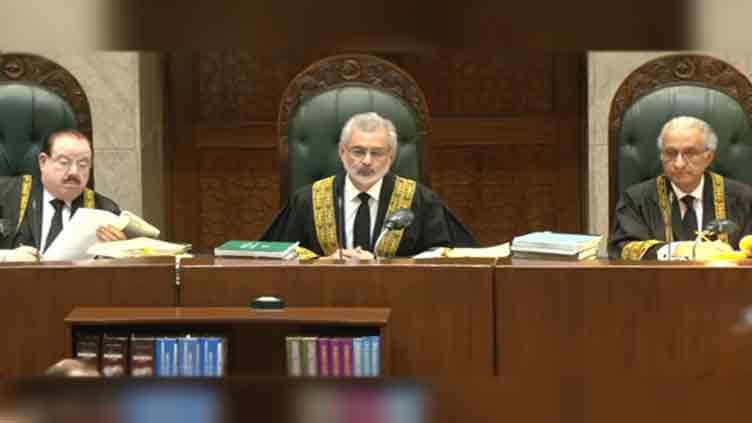ISLAMABAD – A full court bench of Supreme Court on Tuesday resumed hearing petitions challenging the SC (Practice and Procedure) Act.
The proceedings of the top court in the case are being broadcast live by state-run PTV.
The 15-member full court bench includes Chief Justice Qazi Faez Isa, Justice Sardar Tariq Masood, Justice Ijaz Ul Ahsan, Justice Syed Mansoor Ali Shah, Justice Munib Akhtar, Justice Yahya Afridi, Justice Aminuddin Khan, Justice Sayyed Mazahar Ali Akbar Naqvi, Justice Jamal Khan Mandokhel, Justice Muhammad Ali Mazhar, Justice Ayesha A. Malik, Justice Athar Minallah, Justice Syed Hasan Azhar Rizvi, Justice Shahid Waheed and Justice Musarrat Hilali.
At the last hearing, the apex court had sought replies from all parties by September 25.
Govt Submits Reply
The federal government has submitted its reply to the apex court, arguing that the petitions challenging the act are inadmissible as the government can make legislation under Article 191 of the Constitution. It pleaded the top court to reject the petitions.
The government said the law had not limit the freedom of judiciary, adding that no any powers have been withdrawn from the top court.
PML-N seeks dismissal of pleas challenging SC Act
In its concise statement, Pakistan Muslim League–Nawaz (PML-N) pleaded with the top court to dismiss the petitions challenging the law clipping CJP’s powers.
On behalf of the PML-N, its counsel Salahuddin Ahmed submitted a written reply to the top court regarding to the matter.
“The PML-N contends the SC Act 2023 is intra vires the Constitution and is good law. As such, all the instant petitions challenging the same may be dismissed and the interim order passed by this court on April 4, 2023, may be vacated,” read the statement.
It further said that the interim order passed by the Supreme Court to the effect that “the Act that comes into being shall not have, take or b given effect nor be acted upon in any manner” is unprecedented and contrary to the jurisprudence of the apex court.
‘SC Act not an attack on powers of Chief Justice’
At the previous hearing, CJP Isa remarked that the Act did not curtail the top judge’s powers by devolving the suo motu powers to a three-member committee of court.
The hearing was historic because, for the first time in the country’s judicial history, the Supreme Court allowed live telecast of proceedings on the petitions challenging the legislation that aims at regulating the suo motu powers of the top judge.
Background
Earlier this year, the PDM-led government approved a law related to the powers of the chief justice in matters of public interest. It also limit the suo moto powers of the top judge.
Regarding the constitution of benches, the Act stated that every cause, matter or appeal before the apex court would be heard and disposed of by a bench constituted by a committee comprising the CJP and the two senior-most judges. It added that the decisions of the committee would be taken by a majority.
Regarding exercising the apex court’s original jurisdiction, the Act said that any matter invoking the use of Article 184(3) would first be placed before the committee.
The law was later challenged in the apex court. On April 13, an eight-member bench of the top court stayed the implementation of the law.










